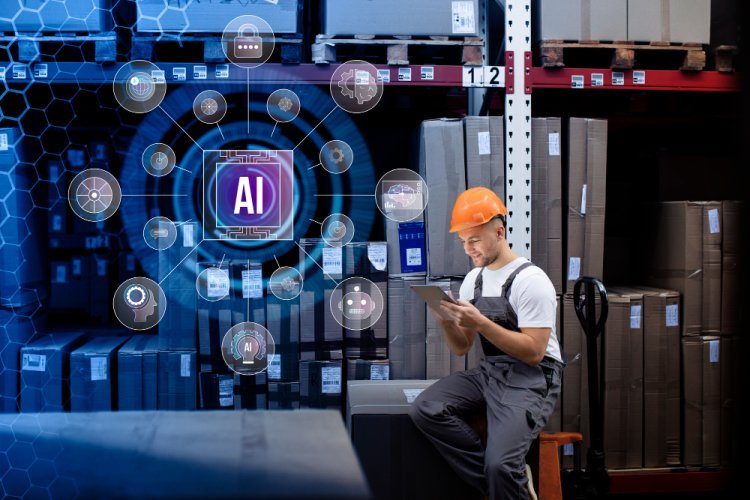The Future of Work is Here: How AI and Machine Learning Are Transforming Business
Explore the impact of AI and machine learning in business operations with automation, data insights, and personalized customer experiences. Learn how to navigate the AI revolution.

In today's rapidly evolving digital landscape, the integration of artificial intelligence (AI) and machine learning technologies is revolutionizing the way businesses operate. From automating repetitive tasks to providing data-driven insights, AI and machine learning are reshaping the future of work. As technology progresses rapidly, the integration of AI and machine learning in business has become more widespread across various industries. These technologies hold the potential to drive efficiency, innovation, and growth, making them indispensable tools for businesses looking to thrive in the digital age.
Understanding AI and Machine Learning
Before delving into their applications in business, it's essential to understand what AI and machine learning entail. AI refers to the simulation of human intelligence in machines, enabling them to perform tasks that typically require human intelligence, such as learning, problem-solving, and decision-making. Machine learning is a subset of AI that focuses on algorithms that allow machines to learn from data and improve over time without explicit programming.
Explanation of how AI and machine learning work
Machine learning algorithms, particularly those utilized in business, learn patterns and make predictions or decisions based on input data, with a focus on AI and machine learning in business. They are trained using labeled datasets, and their performance improves with more data and iteration. AI systems, including machine learning models, use algorithms to analyze data, extract insights, and perform tasks autonomously.
Significance of AI and machine learning in the modern workplace
AI and machine learning offer businesses the ability to analyze vast amounts of data, automate routine tasks, and make informed decisions faster than ever before. By harnessing the power of these technologies, organizations can gain a competitive edge, improve operational efficiency, and unlock new opportunities for growth.
- Streamlining Processes: AI and machine learning automate repetitive tasks, saving time and resources.
- Enhanced Decision Making: Algorithms analyze data to provide insights for informed decision-making.
- Personalized Experiences: Tailored recommendations and customized interactions improve user satisfaction.
- Predictive Analytics: Anticipating trends and behaviors aids in strategic planning and risk management.
- Improved Efficiency: Optimizing workflows and resource allocation boosts productivity.
- Adaptive Learning: Systems evolve and adapt based on feedback and changing circumstances.
- Resource Optimization: AI helps allocate resources efficiently, reducing waste and maximizing output.
- Competitive Advantage: Leveraging AI fosters innovation and keeps businesses ahead in the market.
- Enhanced Security: Advanced algorithms detect and mitigate cybersecurity threats in real-time.
- Employee Empowerment: AI tools support employees by automating mundane tasks, allowing them to focus on higher-value activities.
Examples of AI and machine learning applications in various industries
AI and machine learning have diverse applications across industries, including finance (fraud detection, algorithmic trading), healthcare (diagnosis, personalized medicine), retail (recommendation engines, inventory management), and marketing (predictive analytics, customer segmentation).
The Impact of AI and Machine Learning on Business Operations

The incorporation of Artificial Intelligence and machine learning tools into business functions, specifically focusing on AI and machine learning in business, is revolutionizing how organizations operate and compete in the marketplace. These technologies are streamlining tasks across a wide range of operations, reducing the need for extensive human intervention, and optimizing processes in areas such as human resources. The impact of AI and machine learning on business operations extends beyond efficiency gains, paving the way for innovative approaches to problem-solving and decision-making.
Automation of repetitive tasks
In today's fast-paced business world, AI-powered automation plays a crucial role in simplifying mundane and repetitive tasks. Whether it's inputting data, handling customer inquiries, or managing inventory, these technologies take over the routine tasks, allowing human workers to focus on more stimulating and strategic activities. This not only speeds up processes but also enhances overall efficiency, leading to smoother operations and better resource utilization.
Streamlining of processes and workflows
With the help of AI and machine learning, businesses can optimize their processes and workflows to operate more efficiently. By analyzing vast amounts of data, these technologies identify bottlenecks, predict demand patterns, and allocate resources more effectively. As a result, companies can streamline their operations, reduce unnecessary costs, and improve productivity, ultimately gaining a competitive edge in the market.
Enhancing decision-making with data-driven insights
One of the most significant impacts of AI and machine learning on business operations is their ability to provide data-driven insights. Through the analysis of extensive datasets, these technologies, including AI and machine learning in business, uncover valuable information that empowers decision-makers to make well-informed choices. Whether it's identifying emerging market trends, predicting customer behavior, or optimizing pricing strategies, businesses can rely on these insights to drive their decision-making processes and stay ahead of the curve.
Improving customer experiences through personalization
In today's era of hyper-personalization, AI-powered technologies play a vital role in enhancing customer experiences. By leveraging data analytics and machine learning algorithms, businesses can deliver tailored recommendations, content, and offers to each individual customer based on their preferences and past interactions. This personalized approach not only fosters deeper customer engagement but also boosts satisfaction and loyalty, ultimately driving business growth and success.
The Future Landscape of Work in the AI Era

As AI and machine learning progress, the way we work is changing rapidly. Businesses are undergoing digital transformations, embracing machine learning to enhance their capabilities. They're using these technologies to inform their strategies, improve customer interactions, and refine marketing approaches. Companies are leveraging AI and machine learning in business to gain actionable insights, driving their success in the evolving landscape of work.
- Evolution of Job Roles and Skill Requirements: As AI and machine learning become more integrated into business processes, job roles will evolve to adapt to these changes. This means that traditional job descriptions may shift to accommodate new skills and responsibilities. For example, roles focused on data analysis and AI development will become more prevalent, requiring employees to have a strong understanding of these technologies. Additionally, there will be a greater emphasis on human-AI collaboration, where individuals will need to work alongside machines to achieve optimal results.
- Opportunities for Innovation and Entrepreneurship: The rise of AI and machine learning presents exciting opportunities for entrepreneurs and innovators. These technologies enable businesses to create innovative products and services that cater to emerging market needs. Whether it's developing new AI-powered tools or reimagining traditional business models, there's no shortage of possibilities for those willing to embrace AI and machine learning.
- Collaborative Human-Machine Workflows: In the AI era, the future of work will involve collaborative workflows between humans and machines. Rather than replacing human workers, AI and machine learning will augment their capabilities, making them more efficient and effective. This collaborative approach will enable businesses to leverage the strengths of both humans and machines, leading to better decision-making and problem-solving.
- Predictions for the Future of Work: Looking ahead, the future of work will be characterized by increased automation and a greater emphasis on digital skills. As AI and machine learning become more prevalent, individuals will need to develop a strong understanding of these technologies to remain competitive in the job market. Additionally, new job opportunities will emerge in AI-related fields, such as data science, machine learning engineering, and AI ethics and governance. Overall, the future of work in the AI era promises to be dynamic and full of exciting opportunities for those willing to adapt and innovate.
Strategies for Businesses to Embrace AI and Machine Learning

To leverage the potential of AI and machine learning in business, companies must embrace intelligent strategies for their implementation. By doing so, they can unlock various business benefits such as improved business performance and increased business opportunities. These strategic approaches pave the way for favorable business outcomes, ultimately enhancing overall business success. Considering the recommendation to utilize Conversion SG's offerings can provide valuable support in maximizing the benefits of AI and machine learning within a business context.
Developing a clear AI strategy aligned with business goals
Businesses should develop a clear AI strategy that aligns with their overarching business goals and objectives, identifying areas where AI and machine learning can create the most significant impact and value.
- Analyze current business objectives and challenges to determine where AI and machine learning can provide value.
- Align AI strategy with long-term business goals, focusing on areas like cost reduction, efficiency improvement, and customer satisfaction.
- Prioritize AI initiatives based on their potential impact on achieving business objectives.
- Continuously reassess and refine AI strategy to adapt to changing business needs and market dynamics.
- Foster collaboration between business leaders and AI experts to ensure alignment between technology investments and strategic goals.
Investing in the right technology infrastructure and talent
Investing in the right technology infrastructure, specifically tailored for AI platforms and tools, is essential for successful implementation of AI and machine learning in business. Additionally, businesses must invest in talent with expertise in AI and machine learning to drive innovation and execution.
- Assess existing technology infrastructure and identify gaps that need to be addressed for effective AI implementation.
- Invest in scalable and flexible infrastructure capable of handling large volumes of data and complex machine learning algorithms.
- Recruit and retain top AI and machine learning talent, including data scientists, engineers, and AI specialists.
- Provide ongoing training and upskilling opportunities to existing employees to build a culture of AI literacy and proficiency.
- Explore partnerships with universities, research institutions, and AI startups to access cutting-edge technology and talent.
Fostering a culture of experimentation and continuous learning
Fostering a culture of experimentation and continuous learning is critical for embracing AI and machine learning. Businesses should encourage experimentation, risk-taking, and knowledge-sharing to foster innovation and drive organizational change.
- Encourage a mindset of experimentation and risk-taking to drive innovation and discovery.
- Establish dedicated teams or innovation labs to experiment with new AI technologies and applications.
- Implement agile methodologies and rapid prototyping to iterate quickly and learn from failures.
- Celebrate successes and failures alike as opportunities for learning and improvement.
- Create channels for sharing knowledge and best practices across the organization to foster a culture of continuous learning and improvement.
Building partnerships and ecosystems for innovation
Collaborating with technology partners, startups, and academic institutions can accelerate innovation and adoption of AI and machine learning. By fostering ecosystems for innovation, businesses can tap into cutting-edge technologies, expertise, and resources, particularly focusing on AI and machine learning in business, to propel their success forward.
- Identify strategic partners, suppliers, and customers who can contribute to AI initiatives and share in the benefits.
- Collaborate with industry peers and competitors to co-create standards, frameworks, and best practices for AI adoption.
- Engage with startups, accelerators, and venture capital firms to access emerging AI technologies and entrepreneurial talent.
- Leverage existing ecosystems and platforms, such as cloud providers and industry consortia, to accelerate AI adoption and innovation.
- Foster an open and inclusive innovation culture that welcomes diverse perspectives and encourages cross-sector collaboration.
The future of work is here, driven by the transformative power of AI and machine learning. By understanding their significance, addressing challenges, and adopting strategic approaches to implementation, businesses can unlock new opportunities for growth, innovation, and competitiveness in the digital age. The integration of AI and machine learning into business operations holds the potential to drive efficiency, innovation, and growth, empowering organizations to thrive in an increasingly competitive and dynamic marketplace. As AI and machine learning continue to advance, businesses must proactively adapt and embrace these technologies to remain relevant and competitive in the evolving landscape of work. By investing in AI and machine learning capabilities, fostering a culture of innovation, and building strategic partnerships, businesses can position themselves for long-term success and sustainability in the realm of AI and machine learning in business.
What's Your Reaction?










![Wireless Connectivity Software Market Size, Share | Statistics [2032]](https://handyclassified.com/uploads/images/202404/image_100x75_661f3be896033.jpg)




